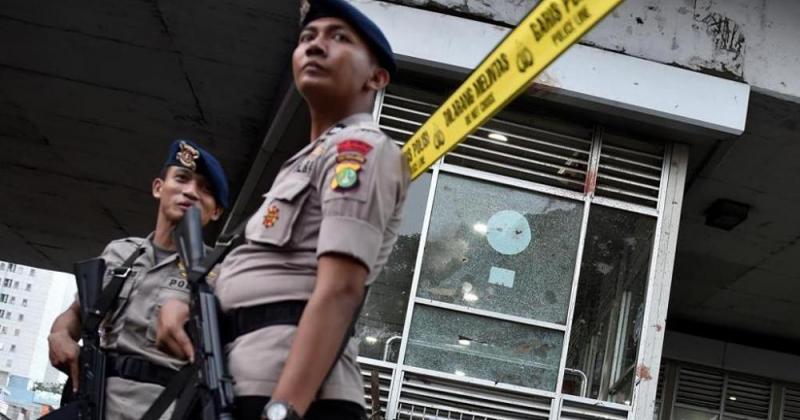The Islamic State’s double attack shakes Jakarta: Christians and Muslims hold on to Pancasila, the Charter of five principles protecting democracy and pluralism.
While Cardinal Jean-Lous Tauran, president of the Pontifical Council for Interreligious Dialogue is delivering his speech on harmony, peace, coexistence, and recalling his stay in Indonesia, the varied assembly gathered in Rome learns about the two explosions that have struck the capital of Jakarta. Silence falls among the present at the seminar titled “Religious pluralism in Indonesia in the era of reform” organized by the Embassy of Indonesia at the Holy See, with the collaboration of the Community of Sant’Egidio.
The death toll is of three dead police officers, in addition to the two kamikaze, and several injured. There are rumors about an act carried out by militants related to the Islamic State, which has laid its eyes and plagiarizing intents on the Muslim communities in Southeast Asia.
Yenny Wahid, head of the prestigious Wahid Institute in Jakarta, which takes its name after her father, Abdurrahman, a Muslim leader and president of Indonesia after the Suharto dictatorship, condemns the violence: “Terrorism will not stop us. The authors of these inhumane attacks intend to destabilize the country,” she declares to Vatican Insider. “But Indonesia will not change its open, pluralistic and tolerant nature. Indonesian Muslims today have the greatest responsibility in challenging radicals to preserve the spirit of fraternity” she remarks.
In Jakarta, tension remains high. Observers note that the double attack in a crowded bus station of the city took place on the eve of the Christian Ascension Day and a few days before the beginning of the holy month of Ramadan, where believers in Allah are required to fast. A potential sign whose intent is probably to undermine relations between religious communities. That is why President Joko Widodo publicly invited Indonesian citizens “to remain calm and to preserve unity. We must defend our peace” even by strengthening the security measures (as much as the institutions can do), and by providing a thorough police investigation to track down the organizers and perpetrators of the massacre.
According to Yenny Wahid, “terrorists want to break up coexistence but we know that dialogue is our only path and we will walk it all the way through.” Indonesia, the most populous Muslim country in the world, characterized by a plurality of ethnicities and religions, is called to do so as, “its situation impacts the entire Islamic world,” she says. A statement echoed by Abdul Mu’ti, secretary-general of the moderate Islamic organization Muhammadiyah, which brings together thirty million Indonesian Muslims, “Terrorists abuse Islam to sow hate or commit inhumane acts. Indonesian civil society ought to remain rooted in the values of democracy, dialogue, respect for pluralism and peaceful coexistence.”
“Diversity is given. Harmony must be nourished, “Ambassador Agus Sriyono wisely said at the opening of the conference. Tauran agrees that to safeguard peace, Indonesia is called to defend and promote the Pancasila, the Charter of the Five Principles (Faith in the One God, Humanity, Unity of the Nations, Democracy, Social Justice) at the base of Democratic Indonesia. “Pancasila - Tauran said - is a guarantee of stability and harmony.” In the Indonesian context, “dialogue is a way to expose that violence disguised as alleged sacredness, it is a way to build peace” the cardinal added.
Prejudices and stereotypes, which often instigate conflicts, were the grounds of the 1999- 2002 “war of religion” fought between the Muslim population and the Protestant Christians living in the Indonesian Moluccas Islands, in the eastern part of the archipelago. Johana Irma Betaubun, a Muslim activist in that province, recalled. “Catholics were the ones who favored the long-awaited reconciliation, through social service activities and a great public initiative of interfaith prayer”. In that conflict non-religious actors were involved, like some military leaders who were interested in pushing the country into instability in order to gain power.
To overcome those dynamics, Indonesia today must learn not to fall into the traps scattered by those who want to destroy the nation’s pluralistic face by instilling, especially among young people, the virus of a Wahhabi Islam. It is a real danger; the nation is becoming a land of conquest for groups coming from Saudi Arabia, with loads of money to set up new Koranic schools and deviate new generations.
“Indonesian Christians are well aware of these challenges, - Valeria Martano of the community of Sant’Egidio, a very active organization in the archipelago, concluded - they will continue to promote tirelessly the path and dialogue and peace.”
